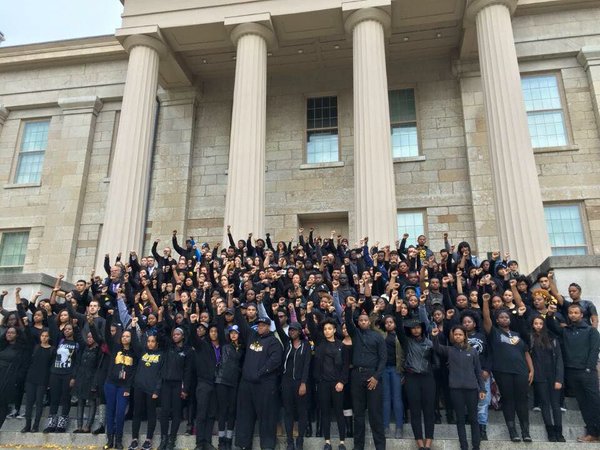You have /5 articles left.
Sign up for a free account or log in.
The sustained protests at the University of Missouri, which led to the ouster of a system president and campus chancellor, are inspiring minority students at many campuses.
On some campuses, students are staging walkouts or protests to show solidarity with those at Missouri. Meanwhile, students are renewing campaigns to force out the president of Ithaca College and to dismiss a controversial professor at Vanderbilt University. Nationally, black students are going online to share information about their experiences at predominantly white institutions.
 Among the campuses where students staged protests to back the Missouri students Wednesday were Smith College, where 200 students and professors left classes at noon, and the University of Iowa, where students didn't walk out of classes but rallied at the Old Capitol (above right), wearing black to show their empathy with black students at Missouri.
Among the campuses where students staged protests to back the Missouri students Wednesday were Smith College, where 200 students and professors left classes at noon, and the University of Iowa, where students didn't walk out of classes but rallied at the Old Capitol (above right), wearing black to show their empathy with black students at Missouri.
Targeting a President at Ithaca
At Ithaca, students have been pushing for the removal of Thomas Rochon as president, citing what they consider his failure to adequately respond to several racially charged incidents, including one at a forum where two alumni referred to a third (a black woman) as “the savage” after she said, “I had this savage hunger” to build a successful career. Minority students have also complained about social events that make fun of black culture and an environment in which they feel unwelcome.
On Wednesday, hundreds of students and faculty members walked out of class and instead participated in a rally calling for the removal of Rochon, who has been pledging to do more to make the campus inclusive and welcoming for all students. On Tuesday, he announced that he is creating a chief diversity officer position. "It has become clear to me that, although we have taken some steps in the right direction, I will need the counsel and full-time focus of a strong and experienced leader with deep knowledge in this area in order to make progress with appropriate speed, inclusivity, accountability and transparency," Rochon said in a statement. "Other institutions have been able to engender lasting change by establishing this level of accountability, and I am confident that this is the right thing for Ithaca College as well."
But that was not enough to stop calls for his removal. The group POC@IC issued a statement that said in part, "The removal of a college president is possible and the reason why [that] should be considered by IC is very clear. The removal of an administrator brings influence back into the hands of the people. This push is not reactionary but strategic because now it brings the campus community directly into administrative affairs. It also opens the doors for the complete restructuring of top-down administration on college campuses. Is the president just a figurehead? Of course, but the point is that the campus body has removed that figurehead and has in turn opened the door for retrieving real sources of power."
The Ithaca College board chair, Tom Grape, gave a statement to The Ithaca Voice that said, "We understand that the issues are serious and significant, and we are listening. I am certain that Ithaca College will emerge from this chapter stronger and more resolute in its direction forward, and the board and I are actively partnering with Tom Rochon and other campus leaders to make sure that happens."
Push to Suspend Vanderbilt Professor
 At Vanderbilt, many minority students have in recent days renewed a push for the university to take action against Carol Swain (right), a tenured professor of political science and law, over a column she wrote in January after the terrorist attacks in Paris against the satirical magazine Charlie Hebdo.
At Vanderbilt, many minority students have in recent days renewed a push for the university to take action against Carol Swain (right), a tenured professor of political science and law, over a column she wrote in January after the terrorist attacks in Paris against the satirical magazine Charlie Hebdo.
In the January column, Swain asked, "What would it take to make us admit we were wrong about Islam? What horrendous attack would finally convince us that Islam is not like other religions in the United States, that it poses an absolute danger to us and our children unless it is monitored better than it has been under the Obama administration?"
Many students and others said that the column stereotyped all Muslims in a way that was profoundly biased, but the university defended Swain's right to free speech.
In the last week, students started a new petition to have her fired, saying that she engages in name-calling, that her use of the word "Professor" on her Facebook page suggests that she speaks for Vanderbilt and that her biases may lead to discrimination against minority students who are not Christian or straight. (Swain is black, but her conservative political views have angered many black people.)
The organizers of the petition then amended their request, calling for Vanderbilt to suspend Swain, not fire her. This change, the petition organizers announced, was "made to more clearly address Swain’s right to free speech."
Vanderbilt's chancellor, Nicholas S. Zeppos, issued a statement Wednesday in which he said that he did not agree with Swain's views, and that he was sorry if any Vanderbilt students felt hurt or unwelcome. Said Zeppos, "Vanderbilt also has a deep and longstanding commitment to freedom of speech and academic freedom, which are the foundations of our university’s scholarly activities. Such freedoms necessarily allow for the expression of unpopular and offensive views. However, speech whose sole purpose or effect is to discriminate, stigmatize, retaliate, offend, foment hatred or violence, or cause harm has no place in this university."
On her Facebook page, Swain pointed readers to an article in National Review that calls the request to suspend her part of the "illiberal idiocy" popular at some campuses. "Swain’s apostasy is that she has made politically incorrect statements about radical Islam and her traditional Christian beliefs, statements that the petitioners deem intolerant and which the university, therefore, must not tolerate -- tolerance, of course, being a one-way street," says the article.
Swain introduced the article by writing on her Facebook page. "The petition itself is full of false allegations," she wrote. "The petition has gone from demanding I be fired immediately, to permanent suspension, to temporary suspension (I am on sabbatical already), to investigating my Facebook page for publicly shaming students (i.e. responding publicly to students who have gone to my Facebook page to insult me), to mandatory sensitivity training for all faculty. It's all logical, right?"
#BlackOnCampus
Also taking off this week is a Twitter hashtag, #BlackOnCampus, which students from campuses all over the United States are using when posting brief descriptions of their challenges being in the minority at predominantly white institutions. Some examples follow:




